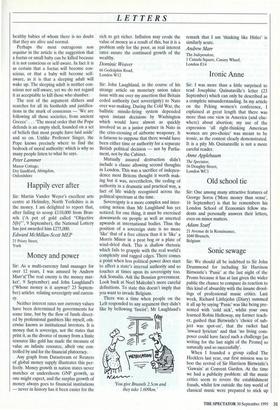Sir: John Laughland, in the course of his strange article
on monetary union takes issue with me over my assertion that Britain ceded authority (not sovereignty) to Nato over war-making. During the Cold War, the ballistic missile-firing system depended upon instant decisions by Washington which would have almost as quickly involved us as a junior partner in Nato in the criss-crossing of airborne weaponry. It is fatuous to suppose that there would have been either time or authority for a separate British political decision — not by Parlia- ment, not by the Cabinet.
Mutually assured destruction didn't include a clause allowing second thoughts in London. This was a sacrifice of indepen- dence most Britons thought it worth mak- ing but it was, nevertheless, the ceding of authority in a dramatic and practical way, a fact of life widely recognised across the political spectrum at the time.
Sovereignty is a more complex and inter- esting notion than Mr Laughland has yet noticed; for one thing, it must be exercised downwards on people as well as asserted upwards at international bodies. Thus the position of a sovereign state is no more `like' that of a free citizen than it is 'like' a Morris Minor in a peat bog or a plate of wind-dried duck. This is shallow rhetoric which fails to grapple with the real world's complexity and ragged edges. There comes a point when less political power does start to affect a state's internal authority and so touches at times upon its sovereignty too. Ask Somalia. Ask the Bosnian government. Look back at Noel Malcolm's more careful definitions. To state this doesn't imply that you want to invade Belgium.
There was a time when people on the Left responded to any argument they didn't like by bellowing 'fascist': Mr Laughland's `You give Brussels 2.5cm and they take 1.609km. ' remark that I am 'thinking like Hitler' is similarly acute.
Andrew Marr
The Independent, 1 Canada Square, Canary Wharf, London E14


































































 Previous page
Previous page